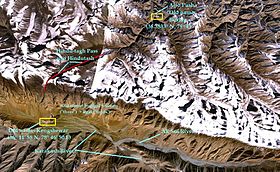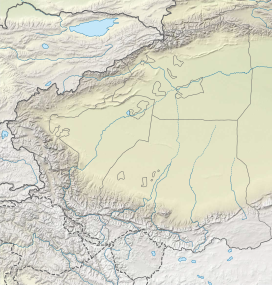| Hindutash Pass | |
|---|---|
 | |
| Elevation | 5,450 m (17,881 ft) |
| Traversed by | |
| Location | Hotan County, Xinjiang, China |
| Range | Kunlun Mountains |
| Coordinates | 36°16′23″N 78°46′50″E / 36.2731°N 78.7806°E |
 | |
| Hindutash Pass | |||||||
|---|---|---|---|---|---|---|---|
| Traditional Chinese | 印地他什達坂 | ||||||
| Simplified Chinese | 印地他什达坂 | ||||||
| |||||||


Hindu-tagh Pass, also known as Hindutash, is a historical mountain pass in the western Xinjiang, China. The pass cuts through the Kunlun Mountains connecting the now-deserted town of Kangxiwar in the Karakash River valley to the town of Pusha in the Pusha Jilga valley (36°23′00″N 79°00′00″E / 36.3833°N 79°E; formerly Bushia). It also connects to the road to the city of Hotan (formerly Khotan or Ilchi; see adjacent maps).[1]
![]() G580 is under construction connecting Kangxiwar directly with Hotan.[2] It will tunnel under Hindutash, connect with the Xinjiang-Tibet Highway G219 to the south after numerous hairpin turns.[3] It is scheduled to be completed in 2022.[4][needs update]
G580 is under construction connecting Kangxiwar directly with Hotan.[2] It will tunnel under Hindutash, connect with the Xinjiang-Tibet Highway G219 to the south after numerous hairpin turns.[3] It is scheduled to be completed in 2022.[4][needs update]
"Hindu-tagh" means "Indian Mountain," and "Hindu-tash," "Indian stone" in the Uyghur dialect of Xinjiang.
- ^ a b (Trotter 1878, p. U8)
- ^ Zeng, Tao-rui; Wang, Lin-feng (2019). "The Reliability and Stability Analysis of High Shear Slope in Cold Region Based on First Order Quadratic Matrix". Science Technology and Engineering (21). kns.ccpd.cnki.net. ISSN 1671-1815. Retrieved 7 January 2020.
Taking the K86 + 780 ~ K86 + 840 soil high cut slope of the highway section from Hetian to Kangxiwa of G580 line as an example, the reliability calculation of soil high cut slope in the cold region was carried out
[permanent dead link] - ^ "新疆G580线和田至康西瓦公路PPP项目施工总承包指挥部" [Xinjiang G580 line Hotan to Kangxiwar road PPP project construction general contracting HQ] (in Chinese). gonglutielu.com. 2017-08-28. Retrieved 7 January 2020.
于印地他什达坂设隧道,出洞后沿等高线展线而下,最终与G219相接。
- ^ 中国交通新闻网 (2019-11-18). "580国道和康项目一标完成路面摊铺" [G580 Hotan-Kangxiwar Project first milestone completed, road surface paved]. Ministry of Transport of the People's Republic of China. Retrieved 7 January 2020.
日前,580国道新疆和田至康西瓦公路项目一标主线沥青路面完成摊铺,为2022年全线通车奠定了坚实基础。
[permanent dead link]
